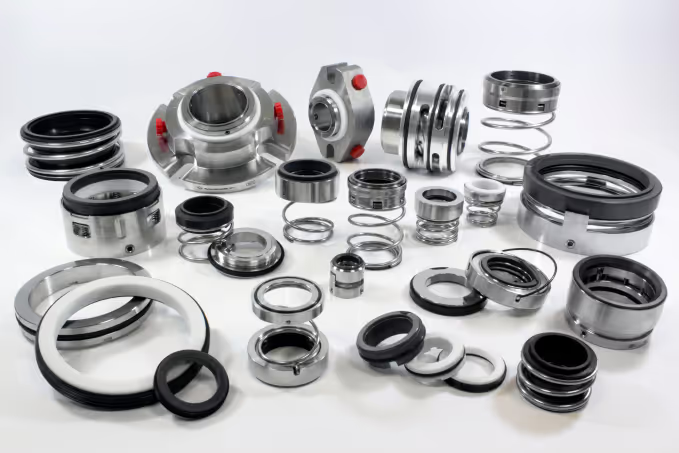
Materialien für mechanische Dichtungen
At Vulcan Seals, we provide comprehensive material information to ensure you choose the right seals for your applications. Our resources empower you with the knowledge needed to make informed decisions.
Die Leistungsfähigkeit, Leistung und Lebensdauer einer Gleitringdichtung werden maßgeblich von der Art, Qualität und Kombination der Materialien beeinflusst. Die Auswahl des Typs und der Materialien der Gleitringdichtung hängt von der Ausrüstung und den Anwendungsparametern ab. Im Folgenden finden Sie eine Einführung in die angebotenen Standardmaterialien Vulkanische Robben mechanische Dichtungen. Weitere technische Unterstützung für Materialqualitäten und Anwendungen ist erhältlich bei Vulkanische Robben.
Gesichter versiegeln
Dichtflächen sind die wichtigsten Dichtflächen einer Gleitringdichtung. In der Regel ist die Auswahl der richtigen Dichtungsflächenmaterialien von entscheidender Bedeutung, um eine effektive Dichtleistung zu gewährleisten. Alle Dichtflächen weisen positive und negative Faktoren auf. Es wird empfohlen, alle Anwendungsparameter zu berücksichtigen.
Kohlenstoff
Kohlenstoff gilt als das wirksamste Dichtungsmaterial, wenn es mit einem deutlich härteren Material kombiniert wird. Es ist kommerziell attraktiv und in mehreren Qualitätsstufen erhältlich. Kohlenstoff gilt als weiche und spröde Dichtfläche und wird daher nicht für die Verwendung in Medien mit festen Partikeln empfohlen.

- VCP1
Doppelt mit Phenolharz imprägnierter Kohlenstoffgraphit, bietet eine außergewöhnliche Dichtleistung und ein hervorragendes Preis-Leistungs-Verhältnis. VCP1 ist die Standardsorte, die für die meisten von Vulkanische Robben Standarddichtungssortimente.
- VCD1
Doppelt mit Phenolharz imprägnierter Kohlenstoffgraphit, der die außergewöhnliche Dichtleistung und den Wert von VCP1 bietet und zusätzlich für den Einsatz in Trinkwasser gemäß FDA- und EG-Vorschriften für den Kontakt mit Lebensmitteln spezifiziert und getestet wurde.
- VCT1
Dreifach mit Phenolharz imprägnierter Kohlenstoffgraphit für eine höhere Verschleißfestigkeit bei anspruchsvollen Anwendungen, besonders effektiv bei Anwendungen mit geringer Schmierung oder in aggressiveren chemischen Medien. VCT1 ist als Standardkohlenstoff für Vulcan Seals spezifiziert. Diese Dichtungssortimente sind speziell für chemische Geräte konzipiert, wie Vulcan Seals Typ 1609 und Vulcan Seals Typ 1659.
- VCA 1
Mit Antimon imprägnierter Kohlenstoffgraphit bietet die effektivste Leistung bei Anwendungen, bei denen die Dichtflächen schlecht oder vorübergehend nicht geschmiert und gekühlt werden. Zum Beispiel Medien mit erhöhter Temperatur.
Aufgrund der potenziellen Gesundheitsrisiken, die durch das Auslaugen der Imprägnierung aus dem Kohlenstoff in das Medium entstehen, sollte VCA1 Carbon nicht für die Herstellung von Lebensmitteln, Getränken oder Inhaltsstoffen für Menschen oder Tiere spezifiziert werden.
Metalle
- Edelstahl
Monolithische Dichtungsköpfe oder stationäre Flächen aus Edelstahl 304 sind eine wirtschaftliche Option für leichte Anwendungen. Edelstahl 316 ist für Lebensmittel und aggressivere chemische Anwendungen erhältlich. Aufgrund der begrenzten Widerstandsfähigkeit gegen physische Beschädigungen müssen die Dichtflächen aus Edelstahl mit einer Dichtfläche aus Carbon kombiniert werden. Edelstahl gilt als weiche Dichtfläche und wird daher nicht für die Verwendung in Medien mit festen Partikeln empfohlen.
- WIN 1
Ni-resistentes Eisen bietet eine extrem verschleißfeste und thermisch stabile Alternative zu Edelstahl für Schmieranwendungen mit Temperaturschwankungen. Ni-Resist ist aufgrund der reaktiven Natur der Eisen- und Nickellegierung nicht für chemisch aktive Medien geeignet, was zu einer Beschädigung der Dichtfläche führt.
Aluminiumoxid-Keramik
- VAW1
Hochreine Aluminiumoxid-Keramik von 99,5% ist eine wirtschaftliche Dichtungsoption, die für allgemeine Anwendungen geeignet ist. Aluminiumoxid-Keramik bietet aufgrund ihrer hohen Härte und ihrer inerten chemischen Eigenschaften eine außergewöhnliche Chemikalien- und Verschleißbeständigkeit. Es ist jedoch anfällig für physikalische und thermische Schockbrüche, weshalb es nicht für Medien mit festen Partikeln, geringer Schmierung oder plötzlichen Temperaturschwankungen geeignet ist.
Siliziumkarbid
Siliziumkarbid gilt als das tribologisch wirksamste Dichtflächenmaterial, wenn es mit einem Kohlenstoffmaterial kombiniert wird. Zunehmend kommerziell attraktiv und in mehreren Qualitäten erhältlich, von denen jede einzigartige Eigenschaften bietet. Siliziumkarbid ist die härteste und verschleißfesteste Dichtfläche und das Material und bietet zudem eine außergewöhnliche chemische Belastbarkeit. Für Schmiermedien mit hohen Feststoffpartikeln wird empfohlen, zwei miteinander verbundene Siliziumkarbid-Dichtflächen zu verwenden.

Weitere Informationen zu den einzelnen Sorten finden Sie in den entsprechenden Vulcan Seals Seite aus Siliziumkarbid.
Wolframkarbid
Wolframkarbid gilt als das widerstandsfähigste Dichtflächenmaterial und bietet eine außergewöhnliche Partikel- und Schlagfestigkeit. Aufgrund der im Vergleich zu Siliziumkarbid geringeren tribologischen Eigenschaften empfiehlt sich die Auswahl einer teuren Werkstoffoption nur für die physikalisch anspruchsvollste Anwendung.
- VTN1 & VTN2
Nickelgebundene Wolframkarbidsorten mit unterschiedlichem Nickelgehalt an rotierenden und stationären Oberflächen sorgen für unterschiedliche Härte- und Oberflächeneigenschaften, unterstützen die Leistung der Dichtfläche, wenn sie miteinander kombiniert werden, und verhindern, dass die Vakuumflächen bei Maschinenstillstand verriegelt werden.
Elastomere
Elastomere sind die sekundären Dichtflächen einer Gleitringdichtung, die in der Regel die mechanische Dichtung gegen die Ausrüstungsteile abdichten. Die Auswahl des richtigen Elastomers ist entscheidend, um die Gesamtleistung der Gleitringdichtung sicherzustellen. Alle Oberflächen von Elastomeren haben positive und negative Faktoren. Es wird empfohlen, alle Anwendungsparameter zu berücksichtigen.
Die folgende Tabelle zeigt das gesamte verfügbare Angebot von Vulkanische Robben mit Nitril (NBR), EPDM und VitonTM/FKM ist die drei am häufigsten verfügbaren mechanischen Produktreihen von Vulcan Seals und deckt den Großteil der industriellen Anwendungen ab.
*Nicht elastomere Materialien, die als Sekundärdichtungen verwendet werden
Bauteile aus Metall
Gleitringdichtungen bestehen in der Regel aus Metallkomponenten, die die Primär- und Sekundärdichtungen (Dichtflächen und Elastomere) belasten, antreiben und aktivieren.
304 Edelstahl ist die Standardlegierung Vulkanische Robben Gleitringdichtungen bestehen aus und sind für die meisten Anwendungen geeignet. Edelstahl 316 ist standardmäßig für Dichtungstypen spezifiziert, die für aggressivere chemische Anwendungen vorgesehen sind. Darüber hinaus kann Edelstahl 316 für alle Typen verwendet werden, bei denen für die Anwendung spezielle FDA- und EG-Lebensmittelkontaktmaterialien erforderlich sind oder bei denen Medien chemisch aggressiver sind.
Vulkanische Robben Gleitringdichtungen verfügen über polierte Oberflächen an den Blech- und Spulenkomponenten und sorgen so für eine feine Oberflächenbeschaffenheit, die das Korrosionsrisiko erheblich reduziert
Als Standardausführung kleinerer Spulen, wie sie bei Gleitringdichtungen mit mehreren Federn und Wellenfedern zum Einsatz kommen, werden Legierungen mit höheren Spezifikationen verwendet, um die Chemikalienbeständigkeit zu verbessern und die Ermüdung der Spule zu verringern. Die Gleitringdichtungstypen von Vulcan Seals sind auf Anfrage mit allen metallischen Komponenten erhältlich, die aus höher chemikalienbeständigen Legierungen wie Hastelloy®, Monel® und Duplex® hergestellt werden.
Die empfohlene Kombination aus Dichtfläche und Elastomer für Ihre spezielle Anwendung finden Sie in der Liste zur chemischen Kompatibilität von Dichtungsmaterialien im Handbuch für mechanische Dichtungen von Vulcan Seals.






































